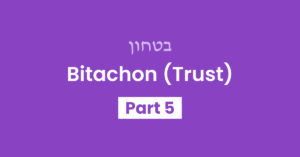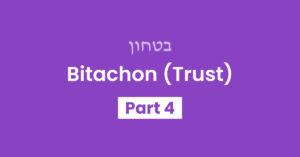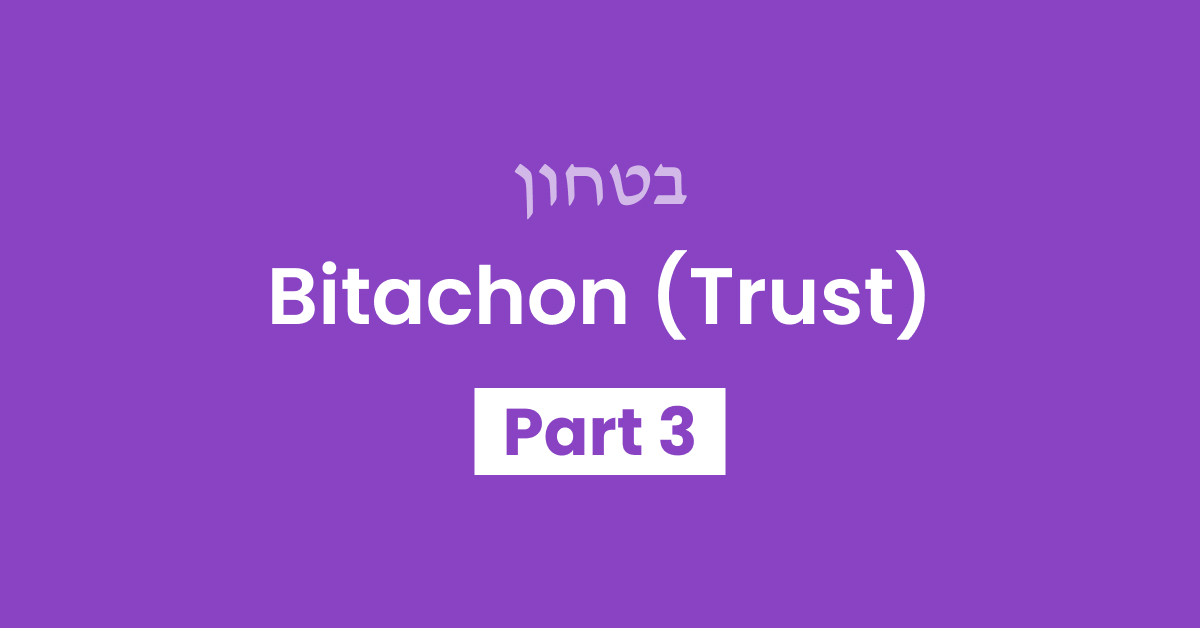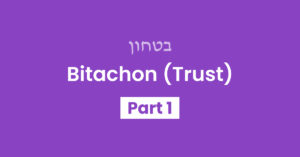Last week, we explained that Bitachon means understanding that Hashem is the only power in the world. Although it may seem as if flowers are growing on their own and cars drive from the power of the engine, the truth is this is just an illusion. We are like a figment of Hashem’s imagination – We cannot move of even exist without Hashem. Nothing can happen unless Hashem allows – and WANTS – it to happen.
It’s one thing to believe that Hashem is in control of nature… but what about other people? Can other people affect what happens to us? If someone steps on your toe, did Hashem make that happen? Or was it the person’s carelessness that caused you pain?
The Sifsei Chaim1 answers that anything that happens to us through human beings is really coming from Hashem. Whether someone steps on your toe or your boss gives you a raise – these, too, come from Hashem. Although it appears as if people have the power to affect us, the truth is that everything is still in Hashem’s control.
No person can ever help or harm me without Hashem wanting it to happen.
No person can ever help or harm me without Hashem wanting it to happen.
This philosophy is based on the Gemara’s principle: “A person does not injure his finger down here [in this world] unless it was decreed from Above.”2 Nothing can happen unless Hashem wants it to happen.
Free Choice: A Contradiction?
Wait a second. How can you say that Hashem controls everything – even what other people do to me? What about free choice? My friend chooses whether or not to give me a compliment. My boss chooses whether or not to give me a raise. How can it be that Hashem is still in control of their actions? If my boss would decide not to give me a raise, then wouldn’t I not get the raise?
Nope. Not true.
The Sifsei Chaim explains that actually, if your boss would decide not to give you a raise… Hashem would send you the money in a different way. The two principles do not contradict at all. Hashem decides how much money every person will have, and then He masterfully coordinates world events to make sure that each person gets exactly what they need. Sometimes, Hashem uses human messengers (like your boss) to deliver the money to you, but every human being still has his own free choice. Hashem looks into the future to see what your boss will decide. If Hashem sees that your boss will use his free will to choose not give you a raise, then Hashem will send you the money in a different way, as the Gemara3 says: “Hashem has many messengers.”
He masterfully coordinates world events to make sure that each person gets exactly what they need.
“Hashem has many messengers.”
There is a hint to this concept in a Torah, regarding the mitzvah to build a fence around your roof so that no one will fall off and get hurt. The Torah writes: “When you build a new house, make a fence around the roof… so that the falling person won’t fall.”4 Why does the Torah call him a “falling person”? He was just a regular person, UNTIL he fell off the roof! Only AFTER he fell, did he become a “falling person,” right?
Well actually, the answer is no. Chazal5 teach us that the person was destined to fall anyway – perhaps he deserved a punishment for his sins or Hashem wanted to test how well he handles life challenges. When Hashem looked into the future and saw that this specific homeowner would choose not to make a fence around his roof, Hashem used him as a “messenger” for causing the “falling person” to fall.
We are each responsible for adding fences around our roofs because we don’t want to be the messenger for letting the person fall, but by calling him a “falling person,” the Torah teaches us that he was going to fall in any case, no matter what that specific homeowner would decide. The homeowner was not the cause of making the man fall, rather, he was just the messenger for carrying out Hashem’s plan.
People have no power of their own – they are just Hashem’s pawns to carry out His master plans.
People have no power of their own – they are just Hashem’s pawns to carry out His master plans.
So what does this mean for us? It means 2 things.
(1) Looking at the past, we need to realize that EVERYTHING came from Hashem. If Rivky stepped on your toe, it means Hashem wanted your toe to be stepped on, and Rivky was just the messenger. If Shimon scratched your car, then yes, you can ask for fair reimbursement, but realize that Shimon was just Hashem’s messenger. If Hashem didn’t want your car to be scratched, then Shimon would never have been able to scratch it.
On the positive side, too, when people do good things to help us, we must realize this came from Hashem, and thank Hashem for it also.6 If your boss gave you a raise, then thank your boss, but alsothank Hashem for giving you more money. If your mother cooks a delicious supper, thank your mother, and alsothank Hashem for giving you delicious food.
(2) Looking toward the future, having bitachon is very reassuring because it means that NO ONE can hurt you without Hashem letting it happen. Hashem loves us and only wants to do what is best for us. So if you are afraid of things that people might do to you – an interviewer turning you down for a job, a teacher giving you a bad grade, even a sibling eating the last cookie in the jar – we can rest assured that no one will be able to harm us unless Hashem wants it to happen.
Aside from worrying about people harming us, we often feel dependent on other people for positive help. As we ask other people for help, we must realize that human beings do not have any power to help us – only Hashem does. If you apply for a new job or new school, do your best to make a good impression on the interviewer, but realize that ultimately, only Hashem decides if you will get accepted or not. If you meet a shadchan, realize that only Hashem is the One to decide when you will get married.
Having bitachon means that we never need to feel desperate! We never need to feel desperate to please other people or make a perfect impression. Yes, we must do our hishtadlus by asking other people for help when necessary, but we should never feel like it’s all up to them.
Having bitachon means that we never need to feel desperate!
Hashem is the only One in control of this world, and if we need something, we can always turn directly to Him.
Hashem is the only One in control of this world, and if we need something, we can always turn directly to Him.
Sources: [1] Sifsei Chaim: Emunah U’Bechirah Vol. I. pgs. 369-374; [2] Chulin 7b; [3] Taanis 18b; [4] Devarim 22:8; [5] Shabbos 32a; [6] Sifsei Chaim, ibid. pgs. 386-388
Your Challenge
Once a day, find a person whom you feel dependent on.
(1) SAY out loud (or whisper, or just think): “This person has no power to help or harm me. Only Hashem has power.”
(2) ASK Hashem to help with whatever you need.
FOR EXAMPLE:
- As you get on the bus, say: “This bus driver has no power to drive. The power to move this bus comes only from Hashem. Hashem, please help me get to wherever I need to go – quickly, easily, and safely.”
- As you send your resume to a shadchan, say: “This shadchan has no power to find me a shidduch. Only Hashem can find my shidduch. Hashem, please help me find the right person to marry very soon.”
- As you see workers stocking the shelves in the supermarket, say: “These workers have no power to provide food for me. Only Hashem has the power to give me food. Hashem, please give me whatever food I need.”
- As you see your teacher marking papers, say: “My teacher has no power to decide how well I will do in school. Only Hashem will determine what grade I will get in the end. Hashem, please help me do well in school.”
Torah Questions
- Which passuk in Tehillim 118 says: “Hashem, I will not fear what people do to me”?
- Which passuk in Tehillim 118 says: “It is better to trust in Hashem than to trust in people”?
- In Mishlei 21:1, Shlomo HaMelech teaches us that there’s something which we think is in a person’s own control, but really it is in Hashem’s control. What is it?
- What is this thing compared to?
- There was someone in the Torah who was originally on such a high level that the angels prepared food for him, requiring no effort on his part. However, after he sinned, he had to start putting in effort (hishtadlus) to prepare his own food. Who was this person? (See Bereishis Chapter 3 or Sanhedrin 59b)
- Which Tanna expressed a very high level of trust in Hashem’s power by saying: “He Who told oil to burn, can also tell vinegar to burn” (Taanis 25a)?
- Who said: “Nothing can stop Hashem from saving us!” (Shmuel Alef 14:6)?
Questions to Ponder
- How many reasons can you think of, to explain why we shouldn’t be totally dependent on other people?
- If someone said: “I don’t believe Hashem is controlling everything in my life! I think that apples just fall because of gravity, and I walk because I use my own two feet!” How would you respond?
- If Hashem can just take care of everything Himself, why do we have to do hishtadlus (put in effort) at all?
- Rabbeinu Yonah says that a person cannot have complete Yiras Hashem (fear of G-d) until he has complete Bitachon. Why is Yiras Shamayim dependent on Bitachon?
- The Shem MiShmuel asks: If Hashem already demonstrated His complete power through performing the 10 plagues in Egypt, what added dimension of Bitachon was Hashem teaching us by Splitting the Sea? How did Splitting the Sea teach us a different lesson in Emunah?






